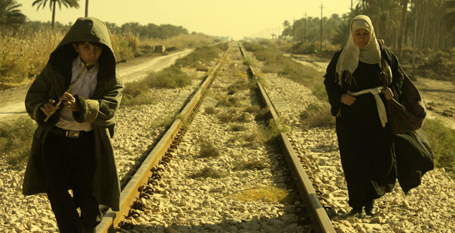
Never really concerned with destinations, the road trip genre is all about the journey. The protagonists and the audience go on the road to see the world (or in this case, the country called Iraq) condensed in that one trip, with the bonus of internal self-discovery during the journey. The road movie genre tends toward comedy more than drama, only because it gets very depressing if you discover what a miserable place the world at large or your country really is.
That’s not to say that the road movie wouldn’t work as a depressing film, or that it shouldn’t be made. Mohamed Al-Daraji gives an excellent reason why it has to be made: audiences need to get a close-up look of an Iraq reeling from both the rapacity and misrule of Saddam Hussein and the rapacity and misrule of its American occupiers.
In Son of Babylon, the sojourners are a Kurdish grandmother and her grandson in tow, on a cross country search for her son – one of the million or more people Saddam’s regime imprisoned or dispatched into mass graves when it wasn’t massacring entire communities in genocidal cleansing campaigns. The places of their pilgrimage are grim: gulag-like prisons, mass graves, endless miles of desert punctuated by a devastated infrastructure that was bombed into the Stone Age by two Gulf Wars and still hasn’t been rebuilt by the occupiers. Their fellow travellers are no cause for cheer either: an Iraq separated by ethnic distrust and a history of bad blood, a populace in permanent mourning or on a permanent search for their mysteriously disappeared relatives.
This isn’t really very harrowing stuff, but the bleakness of the situation will get to you. Son of Babylon is a film that needs to be made because its story must be told and watched by understanding and sympathetic eyes across the world.












 列印版本
列印版本










讀者回應
請先登入再使用此功能。